A man to herald an era

In early 2008 when I visited Delhi for the first time, I was inspired the way Rongthong Kuenley Dorji briefed me about the importance of taking Indian leadership into confidence to push Bhutanese democratic struggle. And enduring through torturous restriction within capital city, he stirred the movement gradually and steadily which brought in a large chunk of the Indian political circle to the support of Bhutanese democratic movement.
A years later, when I visited Delhi again to participate the annual function of the Indo-Bhutan Friendship Society that was created solely through the persistent hardships and efforts of Dorji. And without doubt, DNC has the right to claim that most credit for political changes in Bhutan will go to him and his influential Indian friends in Delhi who tirelessly advocated refugee cause in Delhi hotspots.
My conclusion through regular correspondence, though email, phone and personal contact with Dorji is that Bhutanese democratic movement will not face any such terrible setbacks as it faces today – with the demise of Rongthong Kuenly Dorji. The contribution of Late Dorji will shine in golden letters in the history of Bhutanese democratic struggle. Stepping down from a luxury life to work with the most marginalized and suppressed section of the people, Dorji heightened his personality as a true leader of the Bhutanese citizens. He ignored the life of royalty to be a loyal citizen of land.
His story of torture, trauma and hardships in pursuit of democracy is beyond our recall. He was truly an inspiration for Bhutanese committed to democracy and people’s fundamental rights.
Strategically, Dorji has greatest strokes in Bhutan’s political changes. Bhutanese king continued to advocate against the southern Bhutan uprising terming it as anti-national activism. However, these cliché tends to erode after Dorji fled the country and then organised massive demonstrations in eastern districts. His announcement to form DNC in 1994 put Bhutanese king in lurch. Confused Bhutanese regime, failed to convene national assembly session. Bhutanese king used all techniques to trap him into net and kill with slow poison but all in vain due to visionary personality of Dorji.
Dorji never deviated from his humble mission to democracy despite many assurances and traps put in by the regime. And despite inhuman and barbaric behaviour of the fourth King Jigme Singye, Dorji always abide by his principle that Bhutan remain constitutional monarchy and that not all monarchs are cruel and inhuman as King Jigme Singye. His relatives were killed, tortured and intimidated for failing to convince him stop democratic struggle. That did not shake is feet to bow before autocracy. He always hoped changes are inevitable in Bhutan and were possible with the change in monarch. He replied with bouquet for a stone of Jigme Singye. And it has in fact true. With change in monarch, Bhutan has heralded a new era. And coincidently, all major changes in Bhutan have started after his actions in exile.
It was only Rongthong whom most people inside Bhutan had faith despite their inability to speak in his support and join in his mission for political changes in Bhutan. This is reflected by the news coverage by Bhutanese media on his death. It is only his and R. K. Budathoki’s news are covered by Bhutanese media (Read Kuensel news here).
He had bitter enmity with the fourth king but had greater faith with fifth King Jigme Khesar.
He was not only brilliant with political tactics but with diplomacy which as an amble political leadership should have. His all efforts to participate in 2008 elections did not yield result but I remember him talking with me in confidence in later 2007 in Delhi to mobilize people in Bhutan in support of Jigmi Thinley, who was then not relative to King Jigme Singye. Additionally, he had seen leadership quality in Jigmi Thinley to lead Bhutan in a democratic system.
His death means ¾ power of the Bhutanese political movement is lost. He was the last hope for Bhutanese in exile to lead democratic struggle and protect fundamental human rights of the Bhutanese citizens. Bhutan needs his dreams realised, take up his visionary plans not just condolences and words of sorry.